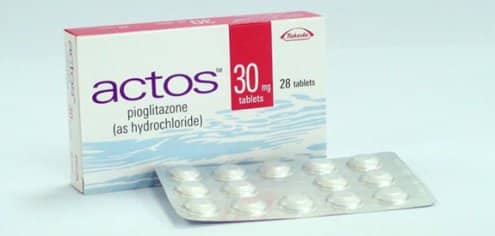What is Actos (Pioglitazone)?
Actos, which is the brand name of Pioglitazone, is a once daily diabetes drug that is prescribed with exercise and diet to regulate the level of blood glucose in type 2 diabetic patients. Actos belongs to a class of diabetes drugs known as thiazolidinediones that work by improving the body’s sensitivity to insulin. Insulin is a hormone that helps to control the level of blood glucose in the body. Pioglitazone may be used with other diabetes drugs, but should not be used to treat type 1 diabetic patients. This medication should be kept under room temperature inside an airtight container to prevent moisture from getting in.
Does Actos Cause Hypoglycemia?
Actos is more likely to cause hypoglycemia or low blood sugar when it is taken in combination with insulin or other diabetes drugs. This drug usually works by making the muscle cells more sensitive to insulin’s effects and reducing the amount of insulin produced by the liver. This way, it will keep your blood glucose levels within the normal range. Unlike sulfonylureas drugs, Pioglitazone does not cause the pancreas to release more amounts of insulin. Hence, thiazolidinediones drugs like Actos are less likely to cause hypoglycemia compared to their counterpart drugs. Sometimes, your health-care provider may prescribe Actos in combination with other diabetes drugs so as to improve glycemic control. In this case, the drug may result in hypoglycemia. Hypoglycemia occurs when your blood glucose levels falls below 72 mg/dL. This condition is normally caused by medication in diabetic patients, although it can be caused by other factors such as excessive meals, skipping meals or taking alcohol.
Hypoglycemia normally manifests itself through symptoms such as
- dizziness
- convulsion
- hunger
- confusion
- blurred vision
- sweating
- fatigue
If you experience these symptoms of hypoglycemia, you should contact your doctor for advice. Your doctor may need to change your medication or reduce your dosage. Usually, hypoglycemia can quickly be treated by taking hard candy or fruit juice. Discuss the best ways to treat hypoglycemia with your doctor
Disclaimer: Please note that the contents of this community article are strictly for informational purposes and should not be considered as medical advice. This article, and other community articles, are not written or reviewed for medical validity by Canadian Insulin or its staff. All views and opinions expressed by the contributing authors are not endorsed by Canadian Insulin. Always consult a medical professional for medical advice, diagnosis, and treatment.


